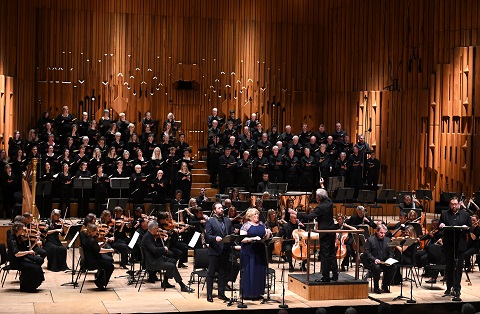There was certainly much for which to be grateful in this BBC SO
performance. An initial tendency, heard for instance in the first scene’s Marche nocturne, for Edward Gardner to drive Berlioz’s music too
hard, was mercifully not maintained. Indeed, as time went on, Gardner’s
tempi relaxed more, greatly to the music’s benefit. The BBC Symphony
Chorus’s singing, at the outset a little woolly, sharpened up too. If
orchestral colours tended to be stronger on individuality then on blend,
that was only a tendency, with plenty of exceptions, not least the opening
woodwind recitative, in which the orchestra, Robert Murray, a fine
Narrator, drew us in, his entry and that of the strings having the drama
gather pace nicely and without exaggeration.
There is something enduringly and endearingly strange to any ‘sacred’ or
perhaps better ‘religious’ work by Berlioz. Just as much as with the
Requiem, it is perfectly clear, without his needing to say so, that he does
not believe a word of it. If that stands very much in a
grand, public, ceremonial tradition
ultimately as empty as Robespierre’s Cult of the Supreme Being, this
becomes an illustrated children’s story that is yet not for children. The
vividness of the writing and, one hopes, the performance too has
characters, scenes, even locations stand out from the pages, but the lack
of belief - not hostile, just ‘as it is’ - remains. That presents its own
very particular challenges to the performers, challenges to which they rose
very well. Herod’s Aria, for instance, sung darkly and clearly by Matthew
Rose, ‘accompanied’ by due orchestral darkness too, might have been sung by
a Shakespearean king; it was difficult not to think of parallels in the
writer Berlioz loved above all others. In the ensuing scene with the
soothsayers, the clarinet first commenting on, then seemingly confirming,
the king’s dream, much must be accomplished by instrumental means alone,
the ‘stage directions’ acting ‘as if’ there were a stage, written
explications to musical ‘illustrations’. Such was certainly the case with
the ‘cabalistic’ movements of the soothsayers as they moved to conjure the
dark spirits to be ‘appeased’. A dark, Theresa May-like tyrannical resolve
was inculcated, heedless of the consequences: infanticide meant
infanticide. Just after the Strong and Stable One had flounced out of
Parliament ‘in real life’, so too did Herod walk offstage: ‘Malgré les
crie, malgré les pleurs de tant de mères éperdues, des rivières de sang
vont être répandues, je serai sourd à ces douleurs.’
Pastoral innocence was just what we needed as balm to such malevolence, and
so we heard - even saw - it at the Bethlehem stable. Karen Cargill’s
beautifully floated lines as Mary remained alert to Berlioz’s
idiosyncracies. Joined by Etienne Dupuis, whose suave, stylish, yet
heartfelt singing proved very much one of the evening’s highlights, this
Holy Family gave us something we might or might not believe in, but which
could certainly enchant. Berlioz’s tone-painting did likewise, although it
had me think his strictures against Haydn in The Creation not
without double standards. Joined by offstage members of the BBC Singers as
angels, singing very much in a choral tradition of French semi-archaism,
this was a scene not just of contemplation but of readiness to depart. It
prepared us as well as the Holy Family well for the short second part: ‘La
fuite en Egypte’, its Overture having me wonder again - as I had during
Herod’s music - whether Mussorgsky knew the music and unconsciously had it
in mind when at work on Boris Godunov. The Russian composer
certainly cherished Berlioz’s treatise on orchestration. Sometimes a
correspondence is just a correspondence; at any rate, parallels, such as
they be, may be worth consideration. The celebrated ‘Shepherds’ Farewell’
flowed nicely, integrated rather than a ‘set piece’. Murray’s narration
reminded us how stylish and meaningful his French singing could be; sweet
toned too, it was really rather wonderful.
The third part, entitled ‘L’Arrivée à Saïs’, is indeed an arrival in more
than a strictly narrative sense. The Holy Family, following malevolent
calls, as May would have it, to GO HOME - ‘Arrière, vils Hébreux,’ shout
the Roman and Egyptian Tories de leurs jours - nevertheless find
shelter with fellow ‘migrants’: an Ishmaelite and his family. And yet -
something that came across gently yet strongly in performance - this is not
the end of the story. Anticipatory narration, clearly, vividly delivered by
Murray and the BBC SO alike, is never quite fulfilled, events and
sentiments in the Ishmaelite house - Berlioz’s fugal chorus especially
relished - a challenge to us, to the readers of his picture-book to respond
or, like many self-styled ‘Christians’, to cross to the other side of the
road, with or without ‘citizens of the world’ abuse. Berlioz’s closing
chorus, euphonious to a degree, sounded a gentle warning: ‘O mon cœur,
emplis-toi du grave et pur amour qui seul peut nous ouvrir le céleste
séjour.’ Will any of us heed it?
Mark Berry
Berlioz, L’Enfance du Christ, Op.25
Karen Cargill (mezzo-soprano); Robert Murray (tenor); Etienne Dupuis
(baritone); Matthew Rose (bass); Members of the BBC Singers; BBC Symphony
Chorus (chorus master: Neil Ferris); BBC Symphony Orchestra/Edward Gardner
(conductor).
Barbican Hall, London; Monday 17th December 2018.
